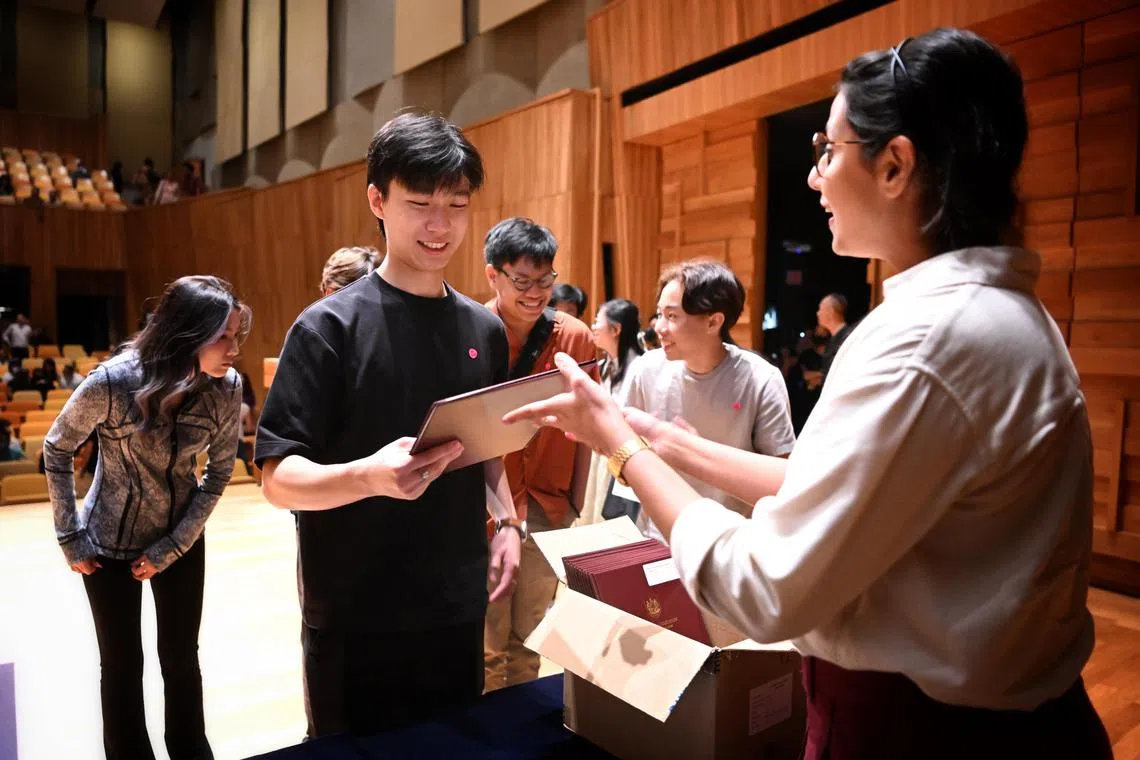No ban on students using AI tool ChatGPT for schoolwork, but ethical use will be taught: IB
Sign up now: Get ST's newsletters delivered to your inbox

IB students can now tap ChatGPT for their schoolwork, but will have to credit any material used to the AI software.
ST PHOTO: CHONG JUN LIANG
SINGAPORE - Students enrolled in International Baccalaureate (IB) programmes in Singapore will now be allowed to use content created by artificial intelligence (AI) tool ChatGPT in their schoolwork.
But any content generated by ChatGPT that students use in their essays should be credited and appropriately referenced, said IB, an organisation based in the Swiss city of Geneva.
In response to queries, an IB spokesman said on Monday: “The IB will not ban the use of artificial intelligence software... That is the wrong way to deal with innovation.
“It is more sensible to adapt and teach students how to use these new tools ethically.”
The spokesman said that over the next few years, the use of this kind of software will become as routine as calculators and translation programmes.
And even if students use AI technology to produce content for their work, they are still expected to produce authentic work that represents their individual abilities, she added.
She said: “The use of ChatGPT or any other AI tool should be in line with the IB’s academic integrity policy, and we expect all of our schools to discuss with students the various types of academic misconduct.
“This means that students need to be aware that the IB does not regard any work produced – even only in part – by such tools to be their own.
“Therefore, as with any quote or material from another source, it must be clear that any AI-generated text, image or graph included in a piece of work has been copied from such software.”
To avoid plagiarism, students must credit the software in the body of the text and appropriately reference it in the bibliography, she added.
The IB spokesman said teachers in IB schools will continue to hold regular meetings with students and use the opportunity to ask them about their ideas and expand on their arguments.
“This ensures the students’ works are true reflections of what they understand,” she said.
ChatGPT was launched by artificial intelligence research laboratory OpenAI last November.
According to a study done by Swiss bank UBS, ChatGPT is estimated to have reached 100 million monthly active users in January, just two months after its launch, making it the fastest-growing consumer application in history.
In January alone, a daily average of about 13 million unique visitors used ChatGPT.
In a blog post on Monday, Mr Matt Glanville, head of IB’s assessment principles and practice, said: “We need to adapt and transform our educational programmes and assessment practices so that students can use these new AI tools ethically and effectively.”
He added that AI essay writing tools may tempt some students to “test the boundaries of what is acceptable”, but teachers have to ensure that students can sufficiently explain their work and be clear when they are quoting other people’s ideas.
Mr Glanville said: “The IB is focused on exploring the educational opportunities that this software has created and is now trying to imagine what a world in which AI software is routinely used would look like.”
IB is a global organisation that operates in more than 150 countries and 5,600 schools. In Singapore, there are 21 schools that offer the IB programme, including Anglo-Chinese School (Independent) and St Joseph’s Institution, as well as several International schools.
A total of 2,276 students in Singapore took the IB exams in November 2022.
In response to queries, several schools that run IB programmes said they will seek to take advantage of this latest development in the AI field for future learning and teaching.
Tanglin Trust School’s deputy academic head (senior school) Claire Russell said that although students are discouraged from citing AI platforms like ChatGPT as a main source of research, the development in AI technology offers exciting opportunities for them.
Tanglin Trust is a British international school in the Buona Vista area that takes in children from ages three to 18.
She said: “The challenge here is in communicating to students that AI isn’t a replacement for real thinking or critical analysis, and that heavy reliance on such platforms can lead away from genuine learning.”
Also, because AI platforms like ChatGPT retrieve information from multiple unknown sources, and the accuracy of the information cannot be guaranteed, students need to be wary about using the chatbot’s content, she added.
But students who still choose to use AI in their research should always practise academic integrity and credit their sources, she said.
At Westbourne College Singapore in River Valley, ChatGPT is seen as a supportive tool in enhancing education and the schooling experience.
Dr Gerard Griffiths, global education director of Westbourne College, said: “We are living in an age where innovations such as ChatGPT are going to disrupt how we do things, and we are going to have to learn how to adapt to such significant and rapid changes.
“The technology will not be used as a crutch, but as a trampoline to launch standards to even greater heights.”
On Feb 6, in response to questions in Parliament, Education Minister Chan Chun Sing said educators in schools and institutes of higher learning (IHL) will be given guidance and resources to effectively use the software
He added that educators will continue to teach students how to understand fundamental concepts and guide them on how to use these technological tools responsibly.
He also said schools and IHLs have practices in place to guard against the misuse of this technology, and students are taught the consequences of plagiarism.


